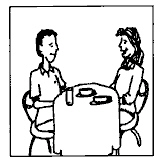Interviews may be more or less formal. In highly formal interviews participants tend to stay closely within social and professional roles. They do little to acknowledge each other as unique individuals. Instead, the interviewer acts as the potential employer, the corrective supervisor, or whatever role is pertinent to the type of interview being conducted. The interviewee also acts from a defined
role: prospective employee, repentant subordinate, and so forth. The content of highly formal interviews tends to follow a standard format, often one that the interviewer has written to structure the interaction. Nonverbal communication provides further clues to formality: clothes, a formal meeting room, stilted postures, and a stiff handshake are all signs of formality. In contrast, informal interviews are more relaxed, personal, and flexible. The interviewer attempts to engage the interviewee as an individual, not just a person in a general role. In turn, the interviewee tends to communicate with the interviewer in more individualistic ways. Typically, informal interviews aren't as rigidly structured as formal interviews. The interviewer may have a list of standard topics (either memorized or written down), but those provide only guidelines, not a straightjacket for communication. Either participant may introduce unusual topics, and they may devote more time than planned to issues that arise. Informal interviews often include nonverbal cues such as smiling, relaxed postures, casual surroundings, and informal dress. The main idea of this passage is
a. nonverbal communication provides clues to formality in interviews.
b. informal and formal interviews have very different characteristics.
c. nonverbal cues include smiling and informal clothing.
d. informal interviews are more flexible than formal ones.
b
You might also like to view...
¿Quién limpió tu casa el fin de semana pasado?
What will be an ideal response?
Underline the inappropriate part and write the proper honorifics or humble forms.
1. ??????????????? 2. ?????????????? 3. ??????????????????????? 4. ?????????????????? 5. ?????????????????? 6. ????????????????
 Claude et Sylvie habitent et travaillent à Genève, en Suisse. Ils travaillent tous les deux dans de grandes entreprises. Le week-end, ils aiment s'amuser avec des amis et faire la cuisine. Ils viennent d'inviter quatre amis chez eux pour dîner samedi soir. Claude et Sylvie font les préparatifs.Click here for audio. Qu'est-ce qu'on sert? Écoutez la conversation entre Claude et Sylvie et complétez-la avec les mots que vous entendez.
Claude et Sylvie habitent et travaillent à Genève, en Suisse. Ils travaillent tous les deux dans de grandes entreprises. Le week-end, ils aiment s'amuser avec des amis et faire la cuisine. Ils viennent d'inviter quatre amis chez eux pour dîner samedi soir. Claude et Sylvie font les préparatifs.Click here for audio. Qu'est-ce qu'on sert? Écoutez la conversation entre Claude et Sylvie et complétez-la avec les mots que vous entendez.
Claude:Sylvie, qu'est-ce que tu (1) ____________________ manger samedi soir? Sylvie:Oh, je ne sais pas. Voyons. Marie (2) ____________________ et Étienne n'aime pas (3) ____________________. On peut manger (4) ____________________ peut-être? Claude:Oui. Bonne idée. Je vais (5) ____________________ et (6) ____________________. Sylvie:D'accord. Comme hors d'œuvre j'ai prévu (7) ____________________ de crevettes. Et comme (8) ____________________? Claude:Moi, j'aime (9) ____________________, mais Sophie et Yves (10) ____________________ les (11) ____________________. Sylvie:OK. Maintenant, je commence à (12) ____________________!(2) Fill in the blank(s) with the appropriate word(s).
Who calls whom a "hypocrite, a liar-worse, worse-a criminal"?
What will be an ideal response?